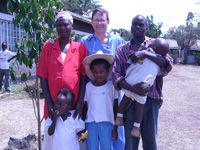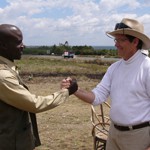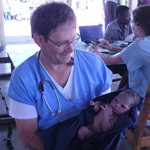Close to home
Posted: November 5, 2009
Patient-centered approach demands global perspective
Whether it’s small town Ohio, rural Texas, or remote villages in Africa, Kirksville College of Osteopathic Medicine graduate John Bowling, D.O., ’69, has always been passionate about bringing healthcare to less developed areas of the world.
As professor and assistant dean for rural medicine at the Texas College of Osteopathic Medicine (TCOM), Dr. Bowling has developed a curriculum to better prepare students for health issues in rural Texas and worldwide.
Before moving to Texas, Dr. Bowling practiced family medicine in Lancaster, Ohio, running his own private practice and assisting the Ohio University College of Osteopathic Medicine (OUCOM) as one of its original clinical adjunct faculty. After turning over his practice to a former student, Dr. Bowling moved to Fort Worth to help transform the family medicine rural track into a complete rural medicine curriculum.
“My career down here kind of evolved serendipitously,” he says. “My training at Kirksville and my experience in a rural practice environment gave me the foundation to understand the needs of rural populations.”
Kirksville and my experience in a rural practice environment gave me the foundation to understand the needs of rural populations.”
Osteopathic medicine is a natural fit for Dr. Bowling, and he knew from the beginning that he wanted to pursue a less traditional path. He chose to attend the Kirksville College of Osteopathic Medicine because of a family physician who graduated from the school, because the rural location made him feel right at home, and because the school has a reputation for a strong academic background. As a fourth-year student, he practiced in rural clinics, and he says this experience honed his interest in rural medicine.
“We were encouraged to become a part of the community, thus learning not just the physical needs of our patients, but their emotional and spiritual needs as well,” he says. “This was a capstone experience in my education and brought to life the meaning of the osteopathic philosophy.”
After years of practicing, Dr. Bowling began to look beyond the borders of the United States, and at TCOM, he wanted to make sure his students obtained experience in Third World medicine. Thanks to some connections, he partnered with OUCOM and its international healthcare program, Share Kenya. This program was developed after a student at the college took classmates and faculty to his rural village in Kenya to provide healthcare. The experience proved so popular that the college adopted the trip into an official international clinical rotation, and each year during the winter holidays, a group from the school travels to western Kenya to work in a clinic they helped to establish.
When Dr. Bowling’s dean suggested TCOM get involved, he traveled with students on the next planned trip and found the journey to be eye-opening.
 “Just the unbelievable differences in the healthcare system between our country and Third World countries make it a life-changing experience,” he says. “It’s especially valuable for a student to experience this, and unbelievably worthwhile. The trips to Africa help provide healthcare to people who desperately need it, but they also prepare future doctors to take on the healthcare crisis here at home, especially in rural areas that lack modern facilities and medical professionals.”
“Just the unbelievable differences in the healthcare system between our country and Third World countries make it a life-changing experience,” he says. “It’s especially valuable for a student to experience this, and unbelievably worthwhile. The trips to Africa help provide healthcare to people who desperately need it, but they also prepare future doctors to take on the healthcare crisis here at home, especially in rural areas that lack modern facilities and medical professionals.”
Today, the two schools cooperate on these trips to Africa and spend about three weeks in Kenya between Thanksgiving and Christmas. The actual work in the clinic lasts anywhere from 10-12 days, and during that time, depending on the number of providers, the students see a staggering 250 to 400 patients each day. The group stays in a city about 25 miles from the village and every day takes a bus or truck to the clinic and assists residents with a variety of ailments including tropical disease and HIV. Dr. Bowling and other preceptors supervise the students and also see patients themselves.
“The thing that impressed me the most was just how resilient the people are,” he says. “The fact that we get upset when we wait in the doctor’s office for 10 minutes longer than we’re supposed to, well, they wait all day in the hot sun under an umbrella to see a doctor who won’t be back for a year.”
Although Dr. Bowling cannot travel to Africa every year, he continues to recruit students at TCOM for the program, which he says is particularly important for osteopathic students.
“The osteopathic profession has always emphasized a patient-centered approach, and involving the patient in decision making and providing training experiences in cultures that have different beliefs reinforces this approach.”